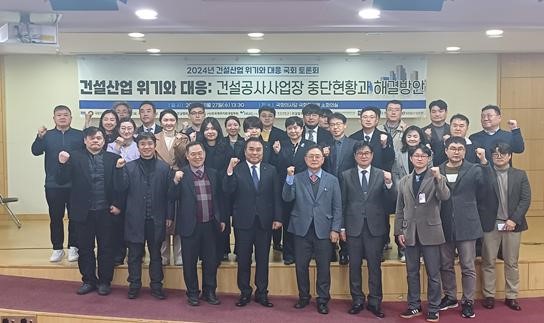Kwangwoon University Graduate School of Construction Legal Affairs
- admin
- 2024-12-17
- 1166
· [Kwangwoon Hot Issue] Graduate School of Construction Legal Affairs Successfully Concludes ‘2024 Construction Industry Crisis and Response National Assembly Forum’
146 views | Created 2024.12.06 | Modified 2024.12.06 | Public
Relations Team
·
Kwangwoon University
Graduate School of Construction Legal Affairs
Concludes ‘2024 Construction Industry Crisis and Response National
Assembly Forum’ Successfully

Photo Courtesy: Korean Society for Debtor Rehabilitation Law
The Graduate
School of Construction Legal Affairs at our university (Dean Lee Chun-won) held
a parliamentary forum on the theme "Current Status and Solutions for
Construction Project Site Suspensions" on Wednesday, November 27, 2024, at
the 2nd Small Conference Room of the National Assembly Members’ Building.
The forum,
co-hosted by Members of the National Assembly Jin Sun-mi, Kim Eun-hye, and Bok
Ki-wang, along with the Korea Specialty Contractors Association (KOSCA), and
jointly organized by Kwangwoon University Graduate School of Construction Legal
Affairs, the Korean Society for Debtor Rehabilitation Law, and the Korea
Housing and Urban Guarantee Corporation (HUG), brought together various experts
to discuss the causes of disputes and solutions for construction project sites
that are either suspended or at risk of suspension. The event featured
presentations followed by a comprehensive discussion.
The first
topic, presented by Professor Yoon Hyung-seok of Kwangwoon University's
Graduate School of Construction Legal Affairs, highlighted cases and causes of
construction sites at risk of suspension. He also discussed the challenges
associated with contract price adjustments due to price fluctuations, which are
one of the key causes of disputes. The second topic, presented by Research
Fellow Kim Sung-woo of the Korea Housing and Urban Guarantee Corporation (HUG),
analyzed distressed real estate project financing (PF) sites. He outlined the
process of real estate PF becoming distressed and offered key insights for
preventing such issues. The third topic, presented by Specialist Kim Soon-tae
(Yulchon LLC and Kwangwoon University Graduate School of Construction Legal
Affairs), addressed the necessity of cooperative bond trusts and their specific
legal principles as a measure to prevent construction project suspensions
caused by issues such as unpaid subcontract payments.
In the
subsequent comprehensive discussion, moderated by Dr. Jung Hee-nam (former
Director of the Korea Real Estate Research Institute), participants engaged in
a passionate debate on the issues and solutions presented. Panelists included
Professor Seo Jin-hyung (Department of Real Estate Legal Affairs, Kwangwoon
University), Attorney Kim Hye-min (Songcheon Law Firm), Attorney Oh Yoon-seok
(Korea Land and Housing Corporation), Team Leader Kim Ki-young (Incheon Urban
Corporation), Director Kang Seung-wan (NH Investment & Securities), and
Attorney Lee Chan (GS Law Firm). Incheon Housing and City Development
Corporation
Meanwhile, the
Graduate School of Construction Legal Affairs, which organized this
parliamentary forum, actively conducts research on current issues and
challenges in the construction industry. Through various academic conferences
and forums, it continues to contribute to the advancement of the construction
legal affairs field. In particular, the Graduate School of Construction Legal
Affairs provides practical educational programs that enable current students
and alumni to gain diverse hands-on experience and knowledge. Through these
programs, it strengthens their capabilities as construction legal
professionals.
Lee Chun-won,
Dean of the Graduate School of Construction Legal Affairs, stated, "I hope
this forum serves as a stepping stone for a new leap forward in the
construction industry." He added, "To address the issue of project
suspensions amid global economic uncertainty, efficient administrative support,
strengthened financial policies, and research on regulatory improvements will
be necessary."
https://www.kw.ac.kr/ko/life/newsletter.jsp?BoardMode=view&DUID=48591&tpage=1?